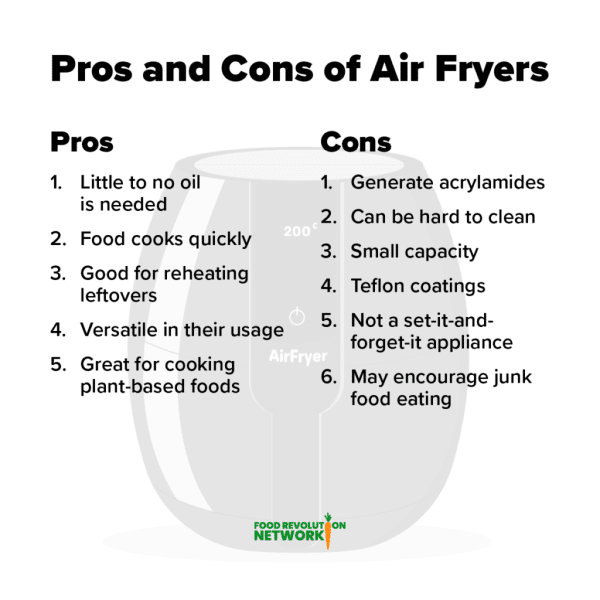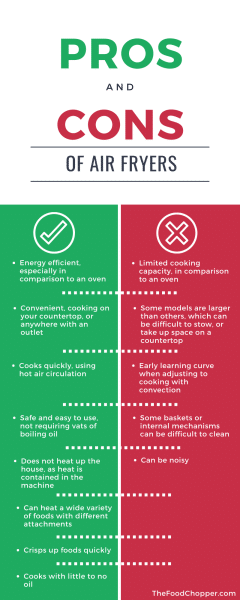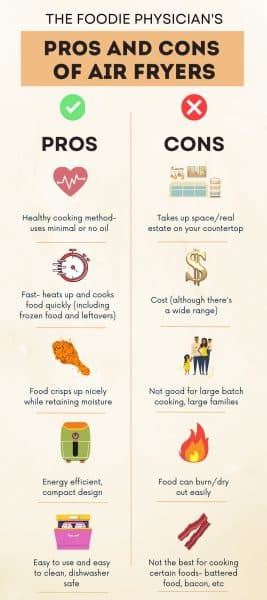You’re curious about the health benefits of air fryers, aren’t you?
Well, look no further! In this article, we’ll explore the pros and cons of using air fryers to help you decide whether they are a healthy addition to your kitchen.
So, let’s get frying and find out if air fryers are as good as they seem!
Health Benefits of Using an Air Fryer
Reduces Oil Consumption
Using an air fryer can significantly reduce your oil consumption, which benefits your health. Traditional deep-frying methods require submerging the food in a large amount of oil, leading to excessive fat intake.
With an air fryer, you only need a small amount of oil, typically a tablespoon or less, to achieve crispy and delicious results. Reducing oil consumption can help lower your overall calorie and fat intake, promoting a healthier lifestyle.
Low-Fat Cooking
A low-fat diet is often recommended for individuals looking to improve their health or manage their weight. Air fryers make it easier to adopt a low-fat cooking style by using hot air circulation to cook food instead of oil.
This cooking method allows you to enjoy your favorite fried foods with significantly less fat. Minimizing your fat intake can reduce the risk of heart disease, obesity, and other health-related issues.
Less Harmful Compounds
Deep-fried foods contain harmful compounds such as acrylamide, advanced glycation end products (AGEs), and increased levels of oxidative stress. These compounds have been linked to an increased risk of certain cancers, diabetes, and inflammation-related diseases.
However, air fryers can help reduce the formation of these harmful compounds. The hot air circulation in an air fryer promotes a gentler cooking process, minimizing the formation of acrylamide and AGEs and reducing oxidative stress on the body.
Preserves Nutrients
High-heat cooking methods, such as deep-frying, can lead to losing essential nutrients in your food. The intense heat breaks down vitamins, minerals, and antioxidants, diminishing their nutritional value.
By using an air fryer, you can preserve the nutrients in your food to a greater extent. The gentle cooking process helps retain more vitamins and minerals, ensuring you receive the maximum nutritional benefits from your meals.
Decreases Calorie Intake
Calorie reduction is crucial for weight management and overall health. Deep-fried foods are often calorie-dense, mainly due to the high amount of oil they absorb during cooking. Air fryers allow you to enjoy your favorite crispy treats with significantly fewer calories.
By using less oil or even opting for oil-free cooking, you can reduce the calorie content of your meals while still enjoying the satisfying crunch of traditionally deep-fried foods.
Healthier Snacking Options
Air fryers offer a wide range of healthy and delicious options for snacking. You can use your air fryer to make guilt-free snacks like crispy kale chips, sweet potato fries, or even banana chips.
These snacks provide a satisfying crunch without traditional deep-fried snacks’ excessive fat and calories. Incorporating these healthier options into your diet allows you to indulge in snacking without compromising your health goals.
Potential Health Concerns of Air Fryers
Acrylamide Formation
Acrylamide is a chemical compound that forms when starchy foods are cooked at high temperatures, particularly during deep-frying or baking. Research has shown that acrylamide is a potential carcinogen and may pose health risks if consumed in large quantities over a long period.
While air fryers can reduce acrylamide formation compared to deep frying, it is essential to be mindful of the cooking times and temperatures to minimize acrylamide levels in your air-fried foods.
Advanced Glycation End Products (AGEs)
Advanced glycation end products are compounds that form when sugars react with proteins or fats during cooking at high temperatures. AGEs have been associated with developing chronic diseases such as diabetes, heart disease, and Alzheimer’s.
While air fryers can help reduce AGE formation compared to deep frying, it is essential to practice moderation and choose cooking methods that minimize the formation of these harmful compounds.
Increased Oxidative Stress
Oxidative stress occurs when there is an imbalance between free radicals and antioxidants in the body. Deep-fried foods contribute to oxidative stress due to the formation of harmful compounds during the cooking process.
While air fryers can help reduce oxidative stress compared to deep frying, it is still essential to consume various antioxidant-rich foods and maintain a balanced diet to minimize the adverse effects of oxidative stress on your health.
Potential for Overeating
Air fryers make it easy to prepare delicious and crispy foods quickly. However, this convenience may lead to overeating if portions are not carefully controlled.
The enticing aroma and taste of air-fried foods may tempt you to consume larger quantities than necessary, increasing calorie intake. Practicing portion control and mindful eating is essential to reap the health benefits of air fryer cooking fully.
Food Safety Risks
Like any cooking method, air frying also poses certain food safety risks. It is crucial to handle and cook food properly to prevent bacterial contamination and foodborne illnesses.
Ensure that you follow recommended cooking temperatures and times for different types of foods. Maintaining proper hygiene by regularly cleaning the air fryer and using safe ingredients will reduce the risk of foodborne illnesses.
Reduces Oil Consumption
How Air Fryers Work
Air fryers circulate hot air around the food to cook it evenly from all sides.
They use Rapid Air Technology to create a whirlwind of superheated air that reaches temperatures up to 400°F (200°C). The hot air rapidly cooks the food, creating a crispy exterior while maintaining a moist and tender interior.
Minimal Oil Requirement
One of the critical advantages of air fryers is that they require minimal oil compared to traditional deep-frying methods.
Depending on the recipe and personal preference, you may only need a tablespoon or less oil to achieve the desired texture and taste. The hot air circulating inside the fryer mimics the effect of hot oil, resulting in a crispy and golden-brown exterior without excessive oil.
Benefits of Reduced Oil Consumption
Reducing oil consumption when using an air fryer has several health benefits. Firstly, it helps decrease your overall calorie intake, making it easier to maintain a healthy weight or promote weight loss.
Secondly, it reduces the intake of unhealthy fats, particularly saturated and trans fats, linked to an increased risk of heart disease. Lastly, it allows you to enjoy your favorite fried foods healthily without compromising taste and texture.
Low-Fat Cooking
Health Implications of a Low-Fat Diet
A low-fat diet has been associated with numerous health benefits. It can help reduce the risk of heart disease, lower cholesterol levels, and promote weight loss.
By limiting your intake of dietary fats, incredibly saturated and trans fats, you can improve your overall cardiovascular health and reduce the risk of developing chronic conditions such as obesity, diabetes, and certain types of cancer.
Air Fryer’s Contribution to Low-Fat Cooking
Air fryers play a significant role in low-fat cooking. By using hot air circulation instead of oil, they provide a healthier alternative to deep frying.
This cooking method allows you to achieve the desired crispiness and texture without the excess fat content. Air fryers can be used for various dishes, from crispy vegetables to chicken wings, offering a delicious low-fat option for your favorite meals.
Importance of Balancing Fat Intake
While air fryers contribute to low-fat cooking, it is essential to remember that not all fats are unhealthy. For optimal health, your body needs certain types of fats, such as monounsaturated and polyunsaturated fats.
These fats can be found in nuts, seeds, avocados, and fatty fish. Balancing your fat intake and including sources of healthy fats in your diet is essential for maintaining a well-rounded and nutritious eating pattern.



































